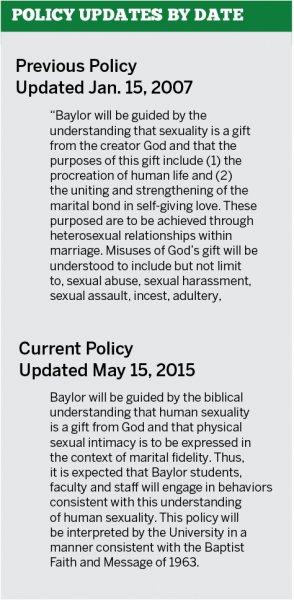By Reubin Turner, Senior Staff Writer
A change to the university’s sexual conduct policy made national headlines this summer after it dropped the phrase “homosexual activity” from its text.
Baylor regents, who approved the change in May, also changed the name of the policy from the “sexual misconduct policy” to the “sexual conduct policy.”
In the old policy, homosexual acts were listed as a misuse of God’s gift of sexuality, and were included among sexual assault, adultery and fornication. 
While some publications such as the Fort Worth Star-Telegram lauded this as a victory for gay rights advocates at the largest Baptist university in the world, many neglected to mention the revised policy’s direct reference to the Baptist Faith and Message of 1963.
The message explicitly recognizes marriage as the unique uniting of one man and one woman for a covenant commitment before God.
“It is God’s unique gift to reveal the union between Christ and His church, and to provide for the man and the woman in marriage the framework for intimate companionship, the channel for sexual expression according to biblical standards, and the means for procreation of the human race,” an excerpt from the document reads.
In an email sent to the Baptist Standard, President and Chancellor Ken Starr said while the media has sensationalized changes to the sexual conduct policy, there has been no change to the university’s policy regarding sexual conduct.
“Baylor’s articulation of its policy required updating. Previously, this policy had been called a ‘Sexual Misconduct Policy.’ As we do not identify other policies similarly—we have no ‘misspending’ policy, for example—we thought it wise to make language changes to the existing policy, which also included the elimination of an extensive but incomplete list of prohibited sexual behaviors and crimes,” Starr wrote in the email.
While there was widespread media speculation that the changes were made as a response to the U.S. Supreme Court’s June decision to legalize gay marriage nationwide in Obergefell v. Hodges, the university said this is not the case.
Lori Fogleman, assistant vice president for media communications, said university officials regularly review university policies to ensure that they comply with both legal and ethical standards. In this case, Fogleman said officials felt the need to articulate more clearly the university’s position in a manner more consistent with the mission of the university.
“These changes were made because we didn’t believe the language reflected Baylor’s caring community,” Fogleman said.
She wrote in an email to the Lariat that since the board’s decision to update the policy’s language was decided on May 15, it “was not made then or in conjunction with” the court’s ruling in late June.
Baylor 2014 alumnus Trenton Garza said although the university’s stance on homosexuality may be the same, this is still a progressive step forward for the university.
“Under the old policy, certain acts were prohibited to homosexuals that did not apply to heterosexuals,” Garza said.
With the new language, both heterosexuals and homosexuals are held to the same sexual code of conduct, Garza said.
Garza was a student senator during the 2013-2014 academic year, and sponsored a bill to have the phrase “homosexual activity” stricken from the sexual misconduct policy.
The bill passed “with flying colors” in an executive session, Garza said, but was vetoed by former student body president Wes Hodges, as previously reported by the Lariat.
Garza said the policy change is nondiscriminatory in two ways since it strikes offensive phrasing from the original text and changes the policy from “sexual misconduct” to “sexual conduct.”
“The term sexual conduct gives it a more positive approach because it shows what is accepted by the university rather than what is prohibited,” Garza said.
There were several alumni, however, who expressed frustration with the change by voicing their opinions on various social media websites, as well as the website for the Baylor Alumni Association.
One alumnus, Rex Carey, wrote on the website a quote by W.R. Inge that states, “The Church that marries the spirit of the present age will find itself a widow in the next.” He then also referred to a scripture from the Bible located in Judges.
Despite these concerns, Starr reiterated in his email to the Baptist Standard that there was no change to the university’s policy regarding sexual conduct.





